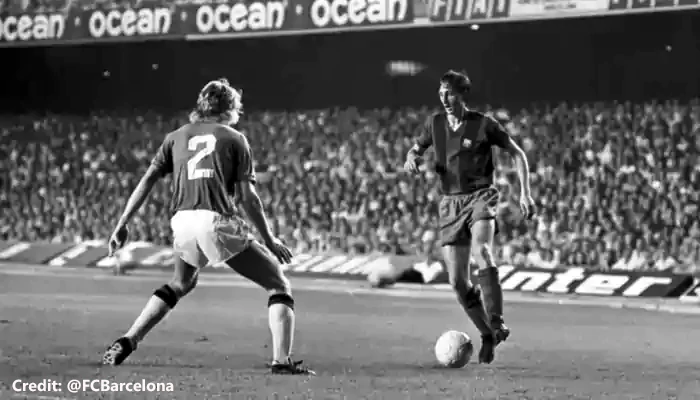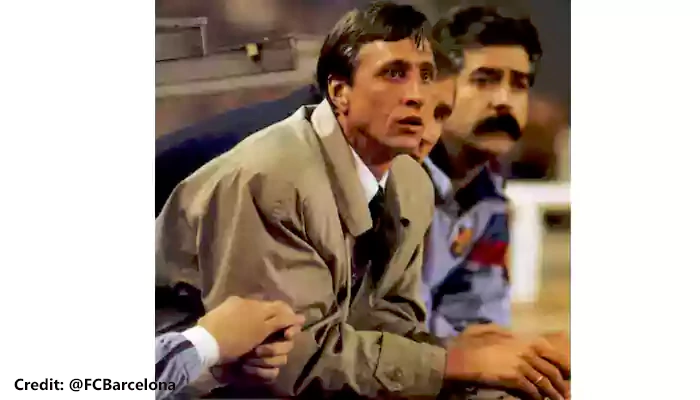Johan Cruyff: The Barcelona Legend That Lives On
Life and Legacy of Johan Cruyff, the Man Who Shaped Barcelona's Footballing Identity.
- Sayan Guha
- 10 December, 2024
- 2 mins ago

Johan Cruyff: The Barcelona Legend That Lives On
Life and Legacy of Johan Cruyff, the Man Who Shaped Barcelona's Footballing Identity.
In the world of football, certain names are etched into history with indelible ink, and Johan Cruyff is undoubtedly one of them. His name resonates not only as a legendary player but as a visionary coach who left an indomitable mark on the beautiful game. To understand the profound impact of Cruyff, we embark on a journey through the annals of football history.
The Dutch Maestro
Born in Amsterdam in 1947, Johan Cruyff's tryst with football began as a young boy playing on the streets of his neighborhood. Little did the world know that this lanky, agile kid would evolve into a football genius. Cruyff's journey to stardom was not without its share of hardships. Raised in the working-class neighbourhood of Betondorp, football became his refuge from life's challenges. As he honed his skills, the streets of Amsterdam bore witness to the birth of a football prodigy.
A Barcelona Love Affair Begins

In the early '70s, Cruyff's career reached its zenith when he joined Barcelona. The Catalan club had been starved of success, but with Cruyff's arrival, a winds-of-change moment began. Under his guidance, Barcelona's football underwent a remarkable transformation. The philosophy of "Total Football," which he had imbibed from his days at Ajax, found a new home at Camp Nou.
Total Football: A Symphony of Movement
Cruyff's brand of football was more than just a game; it was a symphony of movement and artistry. Players were not confined to rigid positions; they flowed seamlessly, interchanging roles like dancers in a ballet. The ball was not just a tool; it was an extension of the player's thoughts. With Cruyff at the helm, Barcelona became the embodiment of Total Football, a spectacle that enthralled fans and confounded opponents.
Cruyff: The Player-Manager Extraordinaire
As a player-manager, Cruyff's influence reached its zenith. He guided Barcelona to their first La Liga title in nearly 15 years. His leadership on and off the field was magnetic, attracting players who shared his footballing philosophy. Under his tutelage, Barcelona's famed youth academy, La Masia, became a factory of talent, churning out future stars.

El Clásico and the Cruyff Turn
Cruyff's impact extended beyond Barcelona's triumphs. The football world was introduced to the "Cruyff Turn," a move that left defenders befuddled. His performances in El Clásico against arch-rivals Real Madrid became legendary. In one iconic moment, he scored a goal that still sends chills down the spines of Barcelona fans.
Legacy Beyond the Pitch
Cruyff's contributions to football were not limited to his playing days. He went on to become a revered coach, shaping the destinies of clubs like Ajax and Barcelona. His managerial style emphasised attacking, possession-based football that left an imprint on generations of players and coaches. Pep Guardiola, a disciple of Cruyff, continued his legacy at Barcelona, transforming them into a footballing juggernaut.
More than a Game
Johan Cruyff's legacy transcends the boundaries of football. His philanthropic efforts, including the Johan Cruyff Foundation, have touched countless lives, providing opportunities for underprivileged children to experience the joy of sports. His words, often sprinkled with wisdom, continue to inspire both on and off the pitch.

The Barcelona DNA
Today, Barcelona's DNA is synonymous with Cruyff's philosophy. The club's commitment to nurturing homegrown talent and playing beautiful football is his enduring gift. Even in his absence, his presence looms large in the hallowed halls of Camp Nou.
A Cruyff Quote to Remember
As we pay homage to Johan Cruyff, let us remember one of his timeless quotes: "Playing football is very simple, but playing simple football is the hardest thing there is." Simple yet profound, it encapsulates his football ideology.
The Eternal Legend
Johan Cruyff may have left this mortal world in 2016, but his spirit lives on in the hearts of football enthusiasts worldwide. His name continues to inspire, his philosophy endures, and his legacy remains eternal. The Barcelona legend, the football visionary, the maestro of Total Football—Johan Cruyff—forever lives on.









